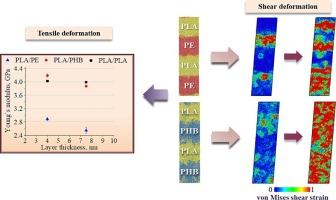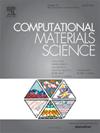Mechanical properties of the multilayer polymer films: Molecular dynamics simulations
IF 3.1
3区 材料科学
Q2 MATERIALS SCIENCE, MULTIDISCIPLINARY
引用次数: 0
Abstract
The effect of several key factors on the mechanical properties of multilayer polymer films under tensile and shear deformations was thoroughly investigated using atomistic molecular dynamics simulations. These factors included the composition of the layers, the compatibility of polymers in the layers, the crystallinity of polymers, and the thickness of the layers, especially when it decreases to values close to the radius of gyration (Rg) of the polymers. Three types of multilayer systems were considered: polylactide/poly(3-hydroxybutyrate) (PLA/PHB) based on polymers compatible for the selected chain lengths, polylactide/polyethylene (PLA/PE) with incompatible polymers in layers, and polylactide/polylactide (PLA/PLA). It was shown that reducing the layer thickness to the value close to Rg led to an increase in Young’s modulus for both types of systems with compatible polymers in layers PLA/PHB and with incompatible polymers PLA/PE. This effect was found for the systems composed of amorphous polymers. The influence of the layer thickness on shear modulus, yield stress under tensile and shear deformations was also analyzed. Young’s modulus and yield stress under tensile deformation were in line with the “rule of mixture” for all types of the systems. Both the shear modulus and yield stress under shear for PLA/PE tended to the values for bulk PE. Analysis of local atomic shear strain was employed to quantify local plastic deformations at the atomic level during the shear deformation. The pattern of local atomic shear strain distribution for the PLA/PHB and PLA/PLA systems was found to be significantly different from that for PLA/PE.

多层聚合物薄膜的机械性能:分子动力学模拟
利用原子分子动力学模拟深入研究了拉伸和剪切变形条件下几个关键因素对多层聚合物薄膜机械性能的影响。这些因素包括层的组成、层中聚合物的相容性、聚合物的结晶度和层的厚度,尤其是当层的厚度减小到接近聚合物的回转半径(Rg)时。研究考虑了三种类型的多层系统:基于选定链长兼容聚合物的聚乳酸/聚(3-羟基丁酸)(PLA/PHB)、层中含有不兼容聚合物的聚乳酸/聚乙烯(PLA/PE)以及聚乳酸/聚乳酸(PLA/PLA)。结果表明,将层厚度减小到接近 Rg 的值会导致两种体系的杨氏模量增大,一种是层中含有相容聚合物的聚乳酸/聚乙烯(PLA/PHB)体系,另一种是层中含有不相容聚合物的聚乳酸/聚乙烯(PLA/PE)体系。由无定形聚合物组成的体系也存在这种效应。此外,还分析了层厚度对剪切模量、拉伸和剪切变形下的屈服应力的影响。对于所有类型的体系,拉伸变形下的杨氏模量和屈服应力都符合 "混合法则"。聚乳酸/聚乙烯在剪切下的剪切模量和屈服应力都趋向于块状聚乙烯的值。局部原子剪切应变分析用于量化剪切变形过程中原子水平的局部塑性变形。发现聚乳酸/PHB 和聚乳酸/PLA 系统的局部原子剪切应变分布模式与聚乳酸/PE 系统有显著不同。
本文章由计算机程序翻译,如有差异,请以英文原文为准。
求助全文
约1分钟内获得全文
求助全文
来源期刊

Computational Materials Science
工程技术-材料科学:综合
CiteScore
6.50
自引率
6.10%
发文量
665
审稿时长
26 days
期刊介绍:
The goal of Computational Materials Science is to report on results that provide new or unique insights into, or significantly expand our understanding of, the properties of materials or phenomena associated with their design, synthesis, processing, characterization, and utilization. To be relevant to the journal, the results should be applied or applicable to specific material systems that are discussed within the submission.
 求助内容:
求助内容: 应助结果提醒方式:
应助结果提醒方式:


